Organic gardening techniques offer a sustainable approach to food production by enhancing soil health and biodiversity. Key practices include crop rotation, natural pest management, and water conservation methods. Innovative technologies further support these techniques, improving efficiency and yields. Each region’s unique practices address local environmental challenges, making organic gardening adaptable and effective.
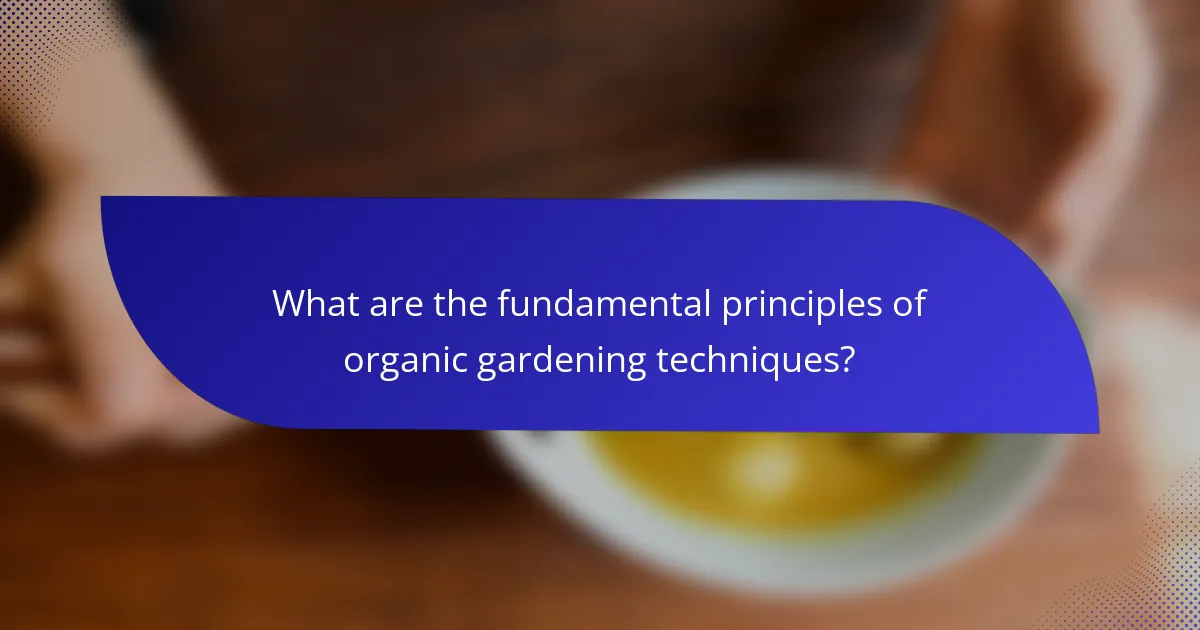
What are the fundamental principles of organic gardening techniques?
Organic gardening techniques focus on fostering healthy ecosystems to produce sustainable food. Key principles include soil health, biodiversity, pest management, crop rotation, and organic inputs.
Soil health is foundational, emphasizing the importance of organic matter and microbial activity. Biodiversity enhances resilience against pests and diseases. Integrated pest management reduces reliance on chemicals, while crop rotation prevents nutrient depletion. Lastly, using organic inputs supports sustainable practices.
How does soil health impact organic gardening?
Soil health significantly enhances organic gardening by promoting nutrient availability and microbial activity. Healthy soil supports robust plant growth, improves water retention, and reduces pests and diseases. Organic practices like composting and crop rotation further enrich soil health, leading to sustainable food production. Healthy soil fosters a diverse ecosystem, which is vital for the resilience of organic gardens.
Why is biodiversity important in organic gardening?
Biodiversity is crucial in organic gardening as it enhances ecosystem resilience and productivity. Diverse plant and animal species contribute to soil health, pest control, and pollination, leading to improved crop yields. For instance, companion planting utilizes beneficial relationships between plants to deter pests naturally. Additionally, a rich variety of organisms supports nutrient cycling, ensuring sustainable food production. Emphasizing biodiversity can reduce reliance on synthetic inputs, aligning with organic gardening principles.
What role do organic fertilizers play in sustainable food production?
Organic fertilizers are essential in sustainable food production as they enhance soil health and promote biodiversity. They improve nutrient availability, support microbial life, and reduce reliance on synthetic chemicals. This leads to healthier crops and improved ecosystem resilience. Organic fertilizers, such as compost and manure, enrich the soil with organic matter, fostering better water retention and soil structure. As a result, they contribute to sustainable agricultural practices by minimizing environmental impact and promoting long-term productivity.
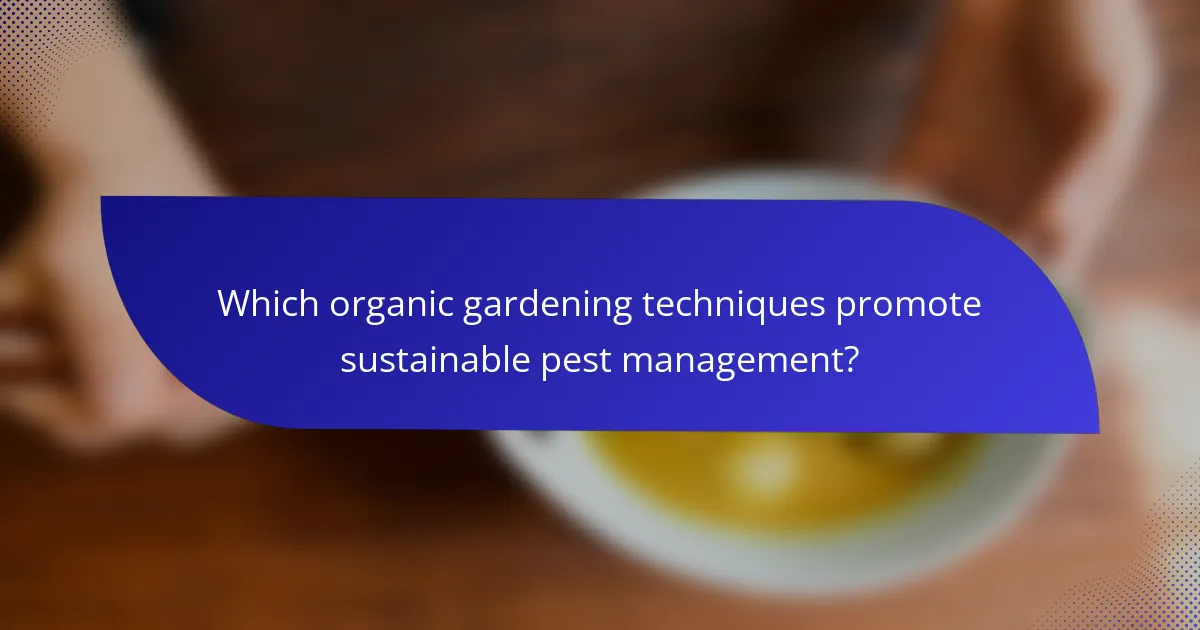
Which organic gardening techniques promote sustainable pest management?
Organic gardening techniques that promote sustainable pest management include crop rotation, companion planting, and the use of beneficial insects. These methods enhance biodiversity and disrupt pest life cycles.
Crop rotation prevents pests and diseases by alternating plant families, reducing the buildup of specific pests. Companion planting involves pairing plants that naturally repel pests or attract beneficial insects, creating a balanced ecosystem.
Beneficial insects, such as ladybugs and lacewings, naturally control pest populations. Implementing these techniques fosters a healthier garden environment while minimizing chemical interventions.
How do companion planting and crop rotation enhance pest control?
Companion planting and crop rotation significantly improve pest control by disrupting pest life cycles and promoting beneficial insects. These organic gardening techniques create a diverse ecosystem, which naturally deters pests and reduces their populations. For example, planting marigolds alongside vegetables can repel nematodes, while rotating crops prevents soilborne diseases. This approach enhances soil health and boosts overall crop resilience, leading to sustainable food production.
What natural pest repellents are effective in organic gardening?
Natural pest repellents effective in organic gardening include neem oil, diatomaceous earth, and garlic spray. These options deter pests without harming beneficial insects. Neem oil disrupts pest life cycles, diatomaceous earth damages exoskeletons, and garlic spray masks plant scents. Each method enhances sustainable food production by reducing reliance on synthetic chemicals.
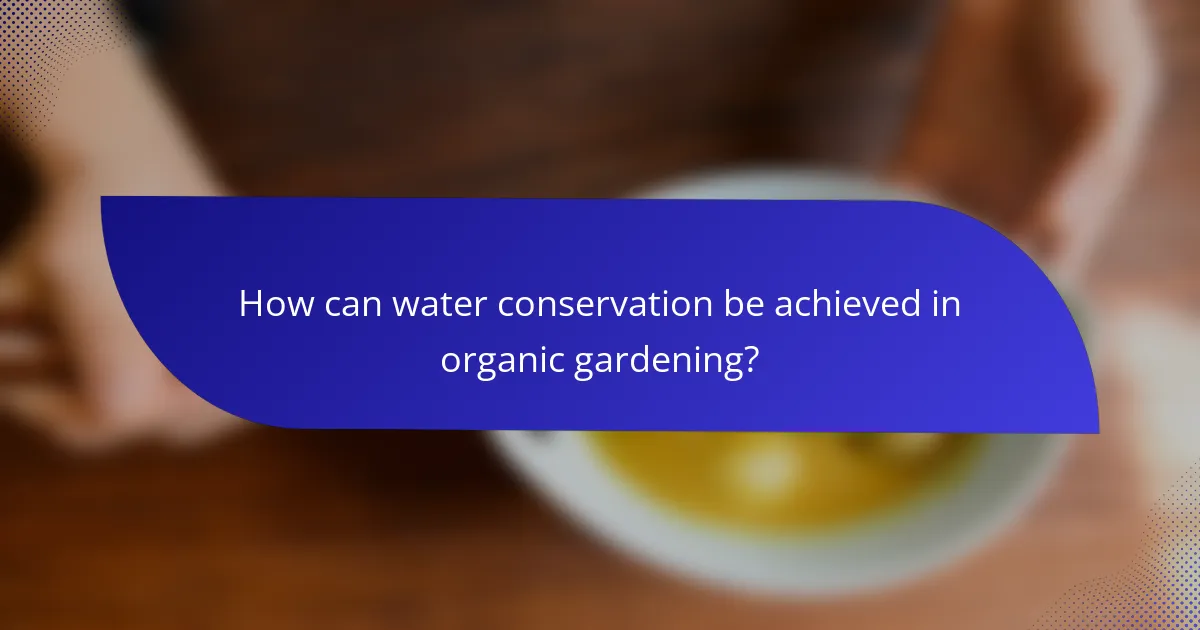
How can water conservation be achieved in organic gardening?
Water conservation in organic gardening can be achieved through techniques like mulching, drip irrigation, and rainwater harvesting. These methods reduce water usage while promoting healthy soil and plant growth.
Mulching involves applying organic materials to the soil surface, which retains moisture and suppresses weeds. Drip irrigation delivers water directly to plant roots, minimizing evaporation. Rainwater harvesting collects and stores rainwater for irrigation, reducing dependence on municipal water sources.
Implementing these practices not only conserves water but also enhances soil health and supports sustainable food production.
What irrigation methods are best for organic gardens?
Drip irrigation and soaker hoses are the best irrigation methods for organic gardens. These methods minimize water waste and deliver moisture directly to the plants’ roots, promoting healthy growth. Drip irrigation systems can be customized to fit various garden layouts, while soaker hoses are easy to install and maintain. Both methods reduce the risk of fungal diseases by keeping foliage dry. Additionally, rainwater harvesting can be integrated into these systems for sustainable water use.
Which mulching techniques help retain soil moisture?
Mulching techniques such as straw, wood chips, and grass clippings effectively retain soil moisture. These organic materials create a barrier that reduces evaporation and maintains consistent soil temperatures. Additionally, they improve soil structure as they decompose, enhancing moisture retention. Using a 2 to 4-inch layer of mulch is recommended for optimal results.
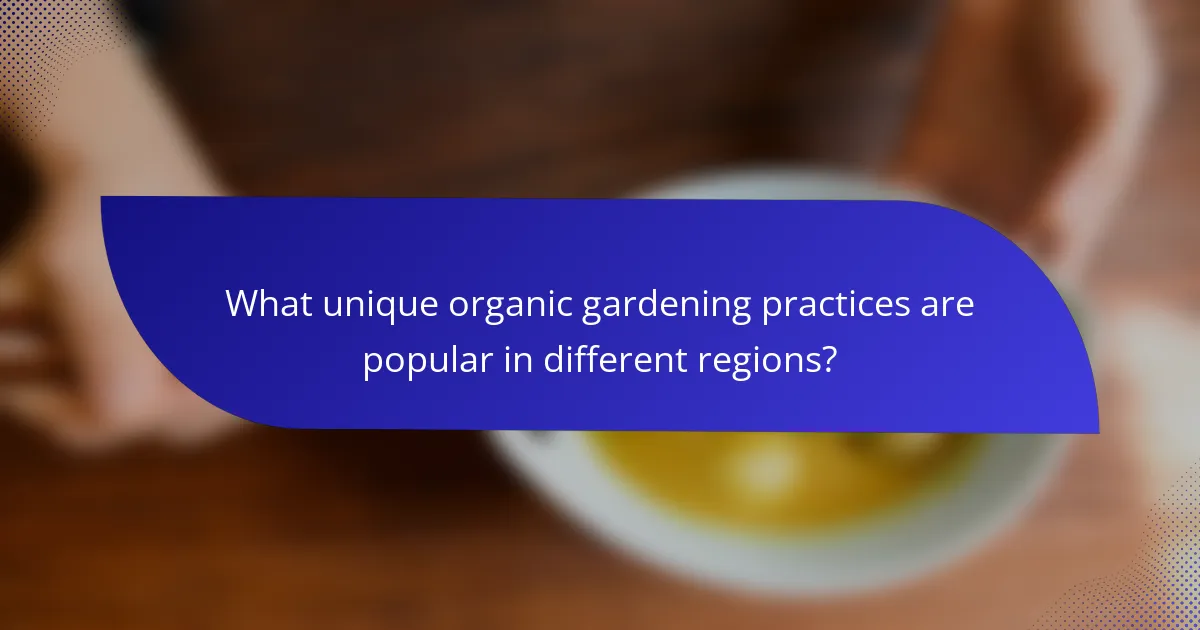
What unique organic gardening practices are popular in different regions?
Unique organic gardening practices vary by region, reflecting local climates and cultures. In the Mediterranean, permaculture techniques focus on water conservation and biodiversity. In the Pacific Northwest, raised beds and companion planting enhance soil health and pest control. The Southwest emphasizes xeriscaping and drought-resistant plants to adapt to arid conditions. In the Midwest, crop rotation and cover cropping improve soil fertility and sustainability. Each region’s practices highlight unique attributes tailored to their environmental challenges.
How does permaculture influence organic gardening techniques?
Permaculture significantly enhances organic gardening techniques by promoting biodiversity and resource efficiency. It encourages the use of natural ecosystems to create sustainable food production systems. This method emphasizes soil health, water conservation, and crop rotation, which are essential for organic gardening. Additionally, permaculture supports companion planting, where different plants benefit each other, improving yields without synthetic inputs. As a result, gardeners can achieve a more resilient and productive ecosystem, aligning with organic principles.
What are the benefits of vertical gardening in urban settings?
Vertical gardening in urban settings offers numerous benefits, including increased food production, improved air quality, and enhanced aesthetics. These gardens utilize limited space efficiently, allowing urban dwellers to grow fresh produce.
Vertical gardens can reduce urban heat, promote biodiversity, and support local ecosystems. They often require less water than traditional gardening methods, making them sustainable. Additionally, they can improve mental well-being by providing green spaces in densely populated areas.
In terms of food production, vertical gardens can yield up to 30% more crops in the same area compared to conventional gardening. This method encourages community engagement and education about sustainable practices.
Overall, vertical gardening transforms urban environments, making them greener and more sustainable while providing fresh food options.
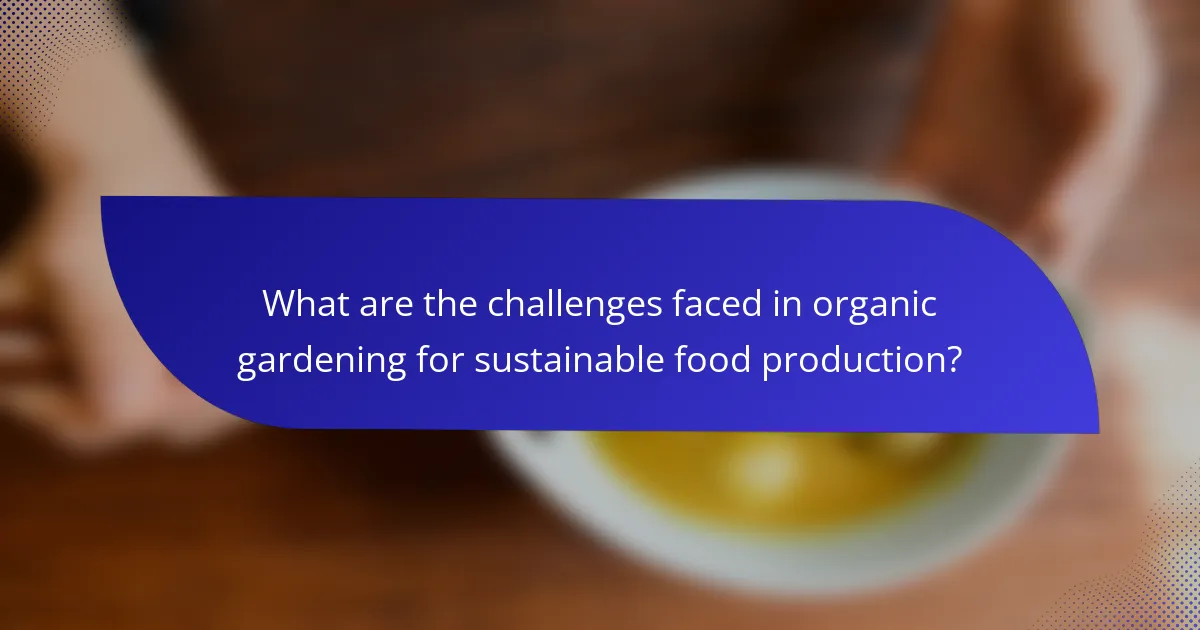
What are the challenges faced in organic gardening for sustainable food production?
Organic gardening faces several challenges that impact sustainable food production. Key issues include soil health management, pest control, and climate variability.
Soil health management is crucial. Organic gardeners must maintain nutrient-rich soil without synthetic fertilizers. This requires practices like crop rotation and composting, which can be labor-intensive and time-consuming.
Pest control poses another significant challenge. Organic methods rely on natural predators and barriers, which may not be as effective as chemical pesticides. This can lead to crop loss and reduced yields.
Climate variability affects organic gardening as well. Unpredictable weather patterns can disrupt planting schedules and affect crop resilience. Gardeners must adapt their strategies to ensure consistent production.
Addressing these challenges requires knowledge, experience, and ongoing commitment to sustainable practices.
How can climate change impact organic gardening practices?
Climate change can significantly alter organic gardening practices. Increased temperatures and erratic weather patterns affect crop yields and pest dynamics.
Organic gardeners may need to adapt by selecting resilient plant varieties. This includes choosing species that thrive in warmer conditions or are resistant to new pests. Additionally, changes in precipitation patterns can necessitate adjustments in irrigation techniques.
Soil health is also impacted, as extreme weather can lead to erosion and nutrient depletion. Implementing cover cropping and mulching can help mitigate these issues.
In summary, organic gardening must evolve to address the challenges posed by climate change, focusing on resilience and sustainability.
What common pests and diseases pose a threat to organic gardeners?
Common pests and diseases that threaten organic gardeners include aphids, spider mites, powdery mildew, and blight. These issues can significantly impact crop yield and quality.
Aphids are small insects that suck sap from plants, weakening them and transmitting viruses. Spider mites thrive in dry conditions, causing leaf discoloration and webbing. Powdery mildew is a fungal disease that appears as white spots on leaves, reducing photosynthesis. Blight, often seen in tomatoes and potatoes, leads to rapid plant decay and can devastate entire crops.
Effective organic management techniques include introducing beneficial insects, applying neem oil, and practicing crop rotation. These strategies help maintain plant health and reduce pest and disease prevalence.
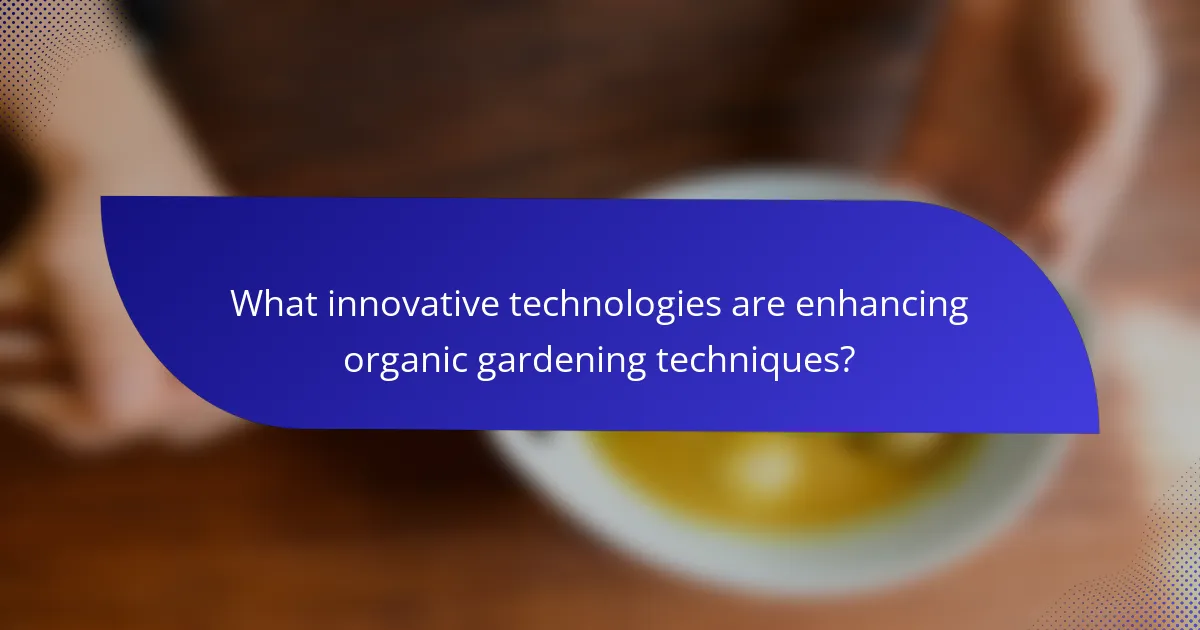
What innovative technologies are enhancing organic gardening techniques?
Innovative technologies enhancing organic gardening techniques include precision agriculture, vertical farming, and smart irrigation systems. These advancements improve resource efficiency and crop yields while minimizing environmental impact. For example, precision agriculture uses data analytics to optimize planting schedules and soil health, resulting in healthier plants and reduced chemical use. Vertical farming maximizes space and reduces water consumption, allowing for year-round production. Smart irrigation systems monitor soil moisture levels, ensuring plants receive adequate water without waste. These technologies collectively support sustainable food production by integrating modern methods with organic practices.
How do precision agriculture tools support organic farming?
Precision agriculture tools enhance organic farming by optimizing resource use and improving crop yields. These tools utilize data analytics, satellite imagery, and sensors to monitor soil health, moisture levels, and crop growth. As a result, farmers can make informed decisions on irrigation, fertilization, and pest management. This data-driven approach aligns with sustainable practices, reducing waste and minimizing environmental impact. Additionally, precision tools can support organic certifications by providing traceability and documentation of farming practices, ensuring compliance with organic standards.
What role does data analysis play in optimizing organic gardening?
Data analysis significantly enhances organic gardening by informing decisions on resource allocation, pest management, and crop rotation. It helps gardeners understand soil health, optimize plant growth, and reduce waste. By analyzing data from previous harvests, gardeners can identify patterns that improve yield. This approach supports sustainable food production by ensuring efficient use of natural resources and minimizing environmental impact.
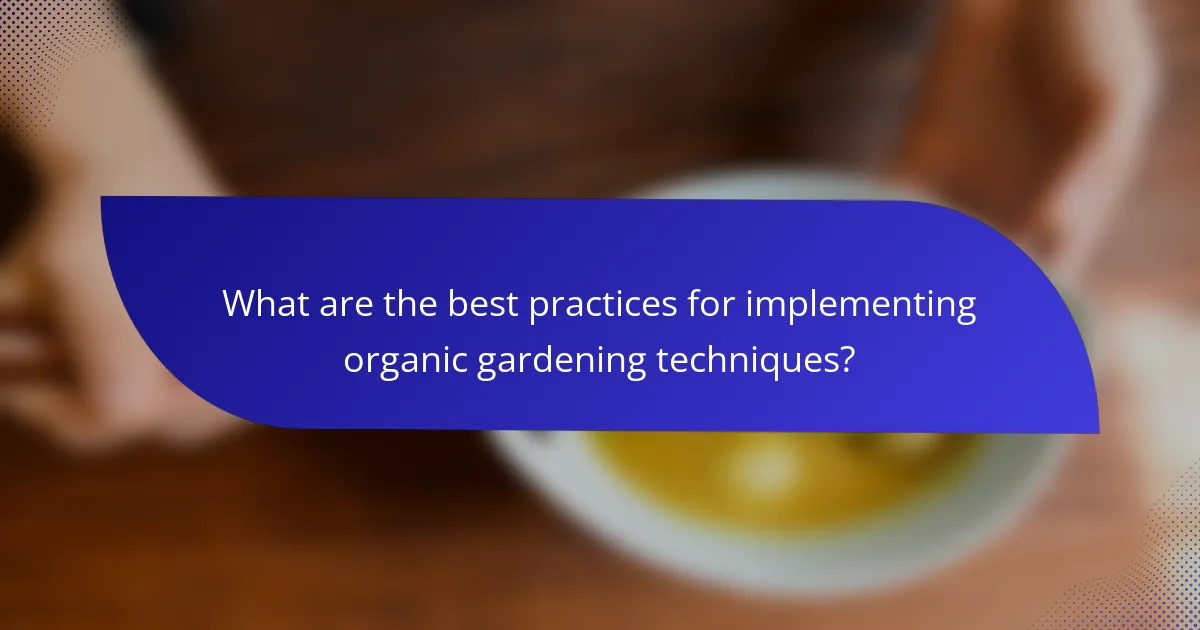
What are the best practices for implementing organic gardening techniques?
To implement organic gardening techniques effectively, focus on soil health, biodiversity, and natural pest control. Prioritize composting, crop rotation, and companion planting to enhance sustainability.
1. Build healthy soil through composting and mulching.
2. Rotate crops annually to prevent soil depletion.
3. Use companion planting to enhance pest resistance.
4. Implement natural pest control methods like beneficial insects.
5. Practice water conservation techniques such as drip irrigation.
What common mistakes should be avoided in organic gardening?
Common mistakes in organic gardening include over-fertilizing, neglecting soil health, and planting incompatible species. These errors can hinder plant growth and reduce crop yield.
1. Over-fertilizing: Excess nutrients can lead to nutrient burn and disrupt soil balance.
2. Neglecting soil health: Poor soil structure affects water retention and nutrient availability.
3. Ignoring pest management: Failing to monitor pests can result in infestations that damage crops.
4. Planting incompatible species: Certain plants may compete for resources, stunting growth.
5. Skipping crop rotation: Repeating the same crops in the same area can deplete soil nutrients.
How can gardeners successfully transition from conventional to organic practices?
Gardeners can successfully transition from conventional to organic practices by following a structured approach. Start by understanding soil health, as healthy soil is fundamental for organic gardening. Implement crop rotation to enhance soil fertility and reduce pests.
Next, choose organic seeds and plants to avoid synthetic chemicals. Introduce natural pest control methods, such as beneficial insects and homemade sprays.
Gradually reduce chemical inputs while monitoring plant health. Educate yourself on organic certifications to ensure compliance and gain consumer trust.
Lastly, connect with local organic gardening communities for support and resources. This transition fosters sustainable food production and enhances biodiversity.